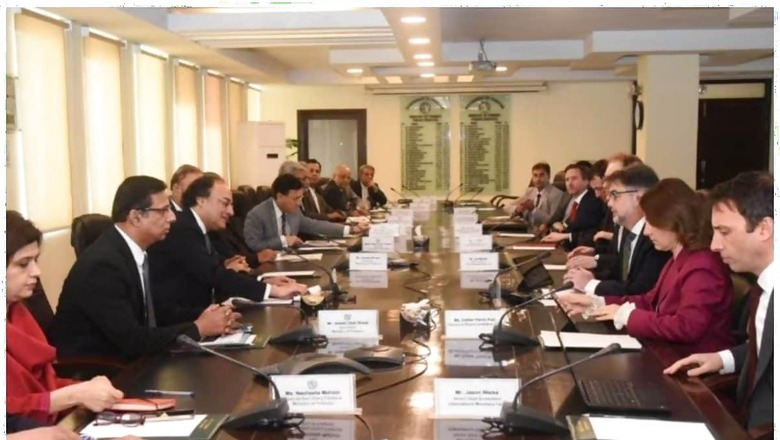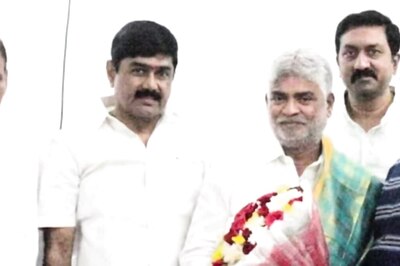
views
Pakistan would require another IMF bailout programme for its macroeconomic stability, the cash-strapped country’s Prime Minister Shehbaz Sharif said on Thursday, a day after Islamabad reached a staff-level agreement with the global lender on the successful completion of the existing short-term facility. Addressing a meeting of the Special Investment and Facilitation Council’s (SIFC) Apex committee, Sharif asserted that the new tranche of the bailout package by the International Monetary Fund (IMF) would likely be received in a few days, but signalled the need for a new programme by the Fund, the Dawn newspaper reported.
Washington-based IMF’s global team reached a staff-level agreement with the Pakistani authorities on the second and final review of Pakistan’s stabilisation programme supported by the global lender’s USD 3 billion standby arrangement approved in July last year. An end-of-mission statement by the IMF on Wednesday said that subject to the approval of its executive board, the staff-level agreement would enable Pakistan to access about USD 1.1 billion — 828 million special drawing rights (SDR) — by late April, the newspaper reported.
Confirming that Pakistan is seeking a 24th medium-term bailout package for a permanent push towards longstanding structural reforms, the Fund laid bare the broader, though well-known, conditionalities of the next programme on which discussions are expected to start in the coming months, the statement added. The IMF said the cash-strapped country expressed interest in a successor medium-term Fund-supported programme to permanently resolve Pakistan’s fiscal and external sustainability weaknesses, strengthening its economic recovery, and laying the foundations for strong, sustainable, and inclusive growth, the report said.
Sharif on Thursday congratulated the finance ministry for closing the SLA with the IMF but said that macroeconomic stability in the country needed to be advanced further and would not be possible without another bailout programme with the Fund. [However], is this our ultimate achievement? The answer is a big no. We have to bring economic stability at the macro-level, and we have to progress it for which it is decided that we cannot survive without another [IMF] agreement, he was quoted as saying in the report.
Questioning whether another programme would be able to bring economic stability, increase the growth trajectory and bring prosperity to the country, he said that the newly elected government would have to work towards a medium-term programme which would have a duration of two-to-three years. And during those years, the government will have to undertake deep-rooted structural reforms, the prime minister said, adding, “To think that the economy will stop bleeding without undertaking those steps is a dream.
Sharif also credited the political parties for their role in the successful negotiations with the IMF. When Pakistan came to close to being on the brink of bankruptcy, the political parties set aside their differences to work for the country, he said, adding that the reforms taken up by the interim government helped achieve the successful IMF reviews.
He also emphasised the importance of political parties setting aside their differences to work towards the country’s well-being, highlighting that politics should be secondary to the state’s interests. In its statement, the IMF said that, as in past programmes, four central areas would remain under focus for reforms.
The top objective of the next medium-term programme Extended Fund Facility of about 36 to 39 months would be strengthening public finances, including through gradual fiscal consolidation and broadening the tax base, especially in under-taxed sectors (read real estate, retail and wholesale trade and agriculture) and improving tax administration to improve debt sustainability and create space for higher priority development and social assistance spending to protect the vulnerable. The second objective of the next programme would be restoring the energy sector’s viability by accelerating cost-reducing reforms, including improving electricity transmission and distribution, moving captive power demand to the electricity grid, strengthening distribution company governance and management, and undertaking effective anti-theft efforts.
The third key objective is returning inflation to the target, with a deeper and more transparent flexible foreign exchange market supporting external rebalancing and rebuilding foreign exchange reserves. The fourth and last critical aim would be promoting private-led activity through the actions mentioned above, as well as the removal of distortionary protection, advancement of state-owned enterprises (SOEs) reforms to improve the sector’s performance, and the scaling up investment in human capital to make economic growth more resilient and inclusive and enable Pakistan to reach its economic potential.
The IMF staff-level agreement recognised the strong programme implementation by the State Bank of Pakistan and the caretaker government in recent months, as well as the new government’s intentions for ongoing policy and reform efforts to move Pakistan from stabilisation to a strong and sustainable recovery. Pakistan’s economic and financial position has improved in the months since the first review, with growth and confidence continuing to recover on the back of prudent policy management and the resumption of inflows from multilateral and bilateral partners, the IMF mission chief to Pakistan, Nathan Porter, noted.
However, growth is expected to be modest this year, and inflation remains well above target, Porter said. Porter emphasised that ongoing policy and reform efforts were required to address Pakistan’s deep-seated economic vulnerabilities amidst the ongoing challenges posed by elevated external and domestic financing needs and an unsettled external environment.
The mission also welcomed the new government’s commitment to continue the policy efforts that started under the current bailout package to entrench economic and financial stability for the remainder of this year. Last year, the IMF Executive Board approved the USD 3 billion Standby Arrangement (SBA) for Pakistan, the term for which is set to expire next month. So far, two tranches have been issued while the last one is pending the review of the conditions set by the lender.
Last year, the timely support by the IMF helped the country to avoid a potential default on its external liabilities.


















Comments
0 comment